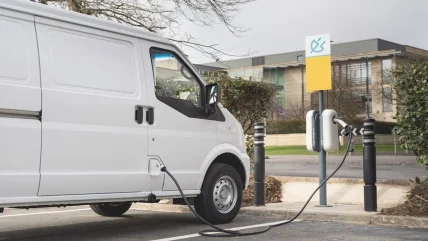
As was the case in last year’s Arval Mobility Observatory survey (AMO), the dominant issue for van operators this time remains how to negotiate the transition from the internal combustion engine (ICE) to electric power.
Shaun Sadlier, head of AMO, says the appetite among fleets of all sizes to switch to electric vans is strong, with 50% vowing to eliminate petrol and diesel within three years, but he warns this trajectory may not be realistic due to problems with the charging infrastructure and the ongoing issues with vehicle supply.
“Looking three years ahead takes us to 2025 and, by that point in time, it is clear that operators expect electricity to be the dominant power source for fleets,” said Sadlier.
“The numbers are stark and show the expected rapidity of the decline of petrol and diesel. By that time, operators expect only half of vans to still be using ICE power.
“This view is remarkably consistent across fleets of all sizes, with an absolute expectation that electrification will happen at speed.
“It is worth underlining however, that this finding does only represent opinion and these predictions may prove to be over optimistic due to the current supply chain issues curtailing the automotive industry. It is unlikely there will be the vehicle supply available to support this degree of change in the short to medium term.
“We’re recommending LCV customers order 12 months in advance of their replacement date,” he added.
The survey canvassed 300 UK fleets and covered businesses of all sizes, from those with fewer than 10 employees, those with between 10 and 99, those with 100 to 999 staff up to companies with a workforce of more than 1,000.
Of concern to van operators will be Sadlier’s assessment that their path to electrification is strewn with more obstacles than those facing car fleets.
“It is van fleets who are going to find moving away from ICE much more of a challenge, with issues surrounding everything from vehicle availability to range suitability and payloads to charging accessibility,” he said.
“There are not necessarily simple solutions to these problems and they are going to test the ingenuity of van operators as they evolve and adapt to EV operation.”
Fleets cited lowering their environmental footprints as the main driver towards adopting alternative fuels (55%) but half of respondents named cutting fuel costs and tax incentives as major considerations.
Other factors were being able to drive in current and future low emission zones, complying with corporate social responsibility policies (CSR) and improving company image.
Significantly, one in two fleets now recognises that total cost of ownership (TCO) of electric vans is in line with, or lower, than petrol or diesel vans – a 15% rise on last year’s survey.
“There is clearly a growing awareness of the potential cost savings available from using non-diesel vehicles,” Sadlier observed.
“With increased operational know-how, fleets can now see the benefits in terms of reduced taxation and fuel spend.”
The main barrier to EV adoption is “the inherent limitations in the charging facilities currently available”, according to Sadlier. He called for on-street chargers to be installed on a widespread basis and for companies to fit charging facilities at their own premises to reduce the reliance of electric vans on public charging points.
While the implementation of zero-emission vehicles was cited as the main challenge across the board, other issues drew more varied responses. Large fleets were far more likely than their smaller counterparts to have embraced connectivity and were more concerned about increased vehicle taxation, whereas smaller businesses were more worried about poor road infrastructure causing congestion.
Returning to the AMO’s dominant theme of electrification, Sadlier concluded that, although challenges remain, “the commitment of van fleet operators to the concept of electrification cannot be doubted”.

